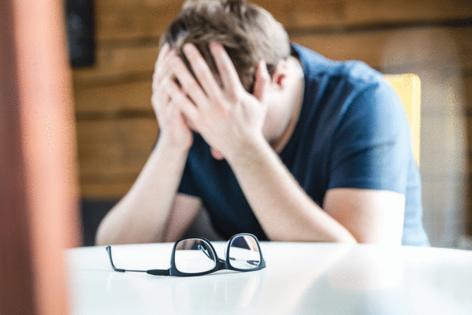Plane crashes, wildfires, government funding, bird flu: 2 mental health experts offer crisis coping advice
Published in Lifestyles
PHILADELPHIA — Airplanes falling out of the sky. A whiplash of headlines detailing the latest developments with federal funding freezes and international tariffs. The spread of bird flu and soaring egg prices. Devastating California wildfires.
If the world feels particularly chaotic right now, that's because it is. And if you're feeling anxious, it's not just you.
"There is a lot of uncertainty in the world, and we are wired to feel anxious when things are uncertain," said Alissa Jerud, a licensed clinical psychologist at Penn Medicine and author of the forthcoming book Emotion-Savvy Parenting.
"It feels like so much and that's because it is so much — it's like a fire hose," said Brian Mullan, a licensed professional counselor with Thriveworks, a mental health provider with offices in Philadelphia and its suburbs. "We are living through momentous changes in history."
The question is how to cope with that anxiety and uncertainty. The Inquirer asked Jerud and Mullan how to calm fears, reduce anxiety and cultivate a sense of control in turbulent times. They offered these tips in interviews that have been edited for length and clarity:
Tip #1 — Be a local change agent
Jerud: "Sometimes thinking about how you can be a helper in this world can help us feel a little more purpose and a little less as though things are just happening to us. So thinking about who in your life might be struggling right now, who you could maybe help out or just lend a listening ear. For some of us, we are politically active, so maybe it's about helping out in a certain advocacy group. Connecting with others and getting that social support and providing that to others can be really helpful."
Mullan: "Is there anybody doing work to make communities safer, to create more green spaces, to marshal resources for traditionally marginalized groups, such as women and people of color. Do they need a hand? I assure you the answer is 'yes.' It can be really helpful to get involved with work that is really meaningful to you."
Tip #2 — Take care of your body
Mullan: "Physical activity and mindful movement is really important for emotional health. It doesn't have to be anything strenuous. Go for a walk. Walking is awesome for you. And after hitting those physical wellness markers, you may want to put your phone on airplane mode for 30 minutes or listen to some music tunes for a period of time. Try a meditation or mindfulness app to help with sleep. Sleep is so intrinsically tied to mood, physical health, attention span, anxiety management, and depression."
Jerud: "Doing things to take care of our bodies will help take care of our minds as well. Things like aiming for balanced sleep, exercising daily, eating healthy, nutritious food at a regular cadence, avoiding food or substances that don't make us feel good — that's all important."
Tip #3 — Connect with friends and family
Mullan: "Pick up the phone and call or text somebody who's important to you, and you're important to them, just to vent. Reach out to those natural supports, like your family and your best friends. Talk therapy and medications are good, but community and connection go such a long way toward helping people feel emotionally safe."
Jerud: "Let those anxieties, those worries, buzz around in the background. That uncertainty is going to be there, but can we shift our attention onto the things that matter to us right now? We don't have to get rid of those thoughts, but can we be in the present? If you're with your kids, being fully with them. If you are out to dinner with friends, really throw yourself in the conversation. If we can do those things, that can go a long way. Be mindful and focus on those things that we can control that are right in front of us."
Tip #4 — Try a therapy tuneup to address a fear, like air travel
Mullan: "Reach out to a professional and talk about it. Sometimes I think people think, 'Oh great, I have to go to therapy for two years.' No. No. No. People should always feel like they are in control of the process. If they want to meet to talk about one issue, great."
Jerud: "Ideally, instead of trying to get rid of that anxiety, we want to let it be there and accept the uncertainty. Anxiety tends not to be so concerned with facts, logic, reason, or probability. In general, flying is an objectively really safe thing to do. It's actually safer than driving. Again, not that your anxiety is going to be appeased by knowing that fact, but that is true. The odds of being in a plane crash are quite low, and it could still happen. It's accepting that and flying anyway."
©2025 The Philadelphia Inquirer, LLC. Visit at inquirer.com. Distributed by Tribune Content Agency, LLC.
























Comments